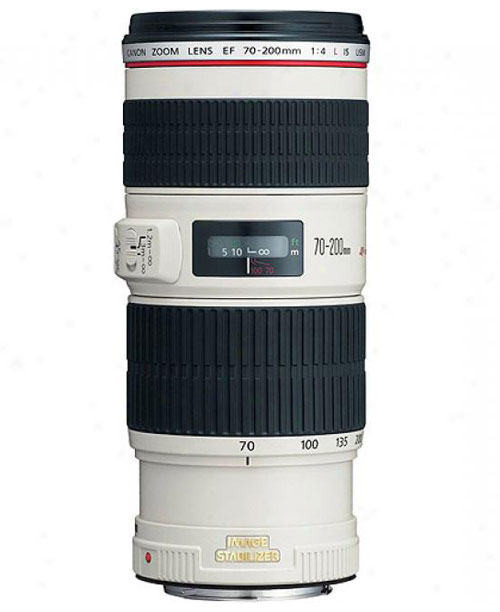Canon EF 70-200mm f/4L IS USM
 |
| Gary Wolstenholme takes a look at how this compact telephoto zoom lens performs. |
Canon's EF 70-200mm f/4L IS USM costs around £800 and has an Image Stabiliser, silent Ultrasonic focusing with full time manual override and is sealed against dust and moisture.
Alternatives include the similar version without an image stabiliser, which can be picked up for around £500. Those with a little more money at their disposal may also look towards Canon's f/2.8 70-200mm. The version with no image stabilisation only costs £100 more than this lens at around £900. Adding an image stabiliser adds a lot to the price. The EF 70-200mm f/2.8L IS II USM costs a whopping £1690, which is more than double for an extra stop of light.
Suitable alternatives from third party manufacturers include Sigma's 70-200mm f/2.8 APO EX DG Macro HSM II, which costs around £650 has a brighter maximum aperture, silent focusing but no image stabilisation. Sigma also now do a stabilised version, which costs a fair bit more at around £1190. Tamron's SP 70-200mm f/2.8 Di SP AF (IF) Macro may also be worth considering as it is currently the cheapest of this type of lens, costing around £620, but has no silent focus motor, weather sealing or image stabilisation.
Canon EF 70-200mm f/4L IS USM: Handling and features
The distinctive look of Canon's white 'L' series lenses is unmistakable. All outer surfaces of the lens, except for the rubber around the zoom and the black plastic around the filter ring are all a cream/white colour. The reasoning behind this is to stop the lens becoming too hot to handle when out shooting in the sun all day, which I have experienced shooting with a black lens in direct sunlight. The white lens look also serves to distinguish it from other lenses in Canon's line-up. People know it's one of their pro lenses at a quick glance.
The lens is sealed again dust and moisture and is built to a high enough standard to take the knocks and scrapes of everyday professional use. Focus is powered by a ring-type ultrasonic motor, which allows manual adjustments to be made at any time. Focusing is swift and accurate, although it did find the lens would occasionally miss the mark when shooting close to the minimum focusing distance.
Both zoom and focus rings are covered in tactile rubber, which provides a firm grip. The width of the controls should mean that there are no issues using the lens with gloves on. The zoom control feel lightly weighted and doesn't stiffen up at any point in the zoom. The focus control is nicely damped, making manual adjustments a pleasure. As focus and zooming are both performed internally, the lens does not extend during either operation.
One of the main features of this lens that will appeal to many is the light weight, especially when compared to its f/2.8 counterparts. This lens weighs only 760g, which is around half the weight of Canon's f/2.8 70-200mm with IS.
The Image Stabiliser fitted to this lens is one of the latest generation that promises to allow hand-held shots to be taken at shutter speeds four stops lower . I was able to get sharp shots with some degree of consistency at 1/13sec with the lens set to 200mm, and even at shutter speeds as low as 1/6sec although at speeds this low it is a bit more hit and miss.
Overall I really enjoyed using this lens, due to the compact size, light weight and excellent build.
Canon EF 70-200mm f/4L IS USM: Performance
During testing this lens proved itself an excellent performer. Wide open at 70mm the centre resolution is already very good, and not too bad towards the edges either. Peak performance is achieved at f/5.6 where the lens performs excellently in the centre, and very good towards the edges.
At 135mm the performance in the centre at maximum aperture is still good, but the quality towards the edges has dropped a little bit more. At this focal length, stopping down to f/8 produces the best sharpness across the frame. And finally at 200mm the quality towards the edges appears to catch up with the centre. The lens is good across the frame at f/4 and performs at its best across the frame at f/8 again. Here the lens produces very good sharpness from edge to edge.
Being one of Canon's 'L' series lenses, all sorts of exotic glass has been used to control chromatic aberrations. Throughout the zoom range fringing is kept within acceptable levels and may only be visible in very large prints with areas of very high contrast towards the edge of the frame.
Falloff of illumination towards the corners is reasonable for a telephoto such as this. At 70mm and f/4 the corners are 1.47 stops darker than the image centre and images taken at f/8 at this focal length are visually uniform. At 200mm the corners are exactly 2 stops darker than the image centre, which may more noticeable in certain circumstances. Again stopping down to f/8 results in visually uniform illumination.
At 70mm there is only a tiny amount of barrel distortion present. Here Imatest recorded 1.01% barrel distortion, which will be barely noticeable in all but the most critical applications. At 200mm, barrel distortion is replaced with pincushion distortion, and the level is still acceptably low at 1.89%. the distortion at both end is uniform, so should be simple to correct in image editing software afterwards.
This EF 70-200mm is very resistant to flare, ghosting and loss of contrast. Even shooting into the light the lens yields images with excellent contrast most of the time. A deep circular hood is supplied with the lens which helps to keep extraneous light out of the optical path.
 | DxOMark provides objective, independent, RAW-based image quality performance data for lenses and digital cameras to help you select the best equipment to meet your photographic needs. Visit the DxOMark website for tests performed on the Canon EF 70-200mm f/4L IS USM. |
Canon EF 70-200mm f/4L IS USM: Verdict
There is no doubting that this is a fantastic piece of optical engineering. The build quality is excellent, it focuses quickly, the image stabiliser works well and above all it's sharp throughout the zoom range, at least in the centre.
If you're not in need of the fast f/2.8 aperture found on Canon's more expensive tele-zooms, but still require the best quality Canon can muster, then this lens represents pretty good value and should be worth serious consideration.
 |
| A superb quality lens that won't leave many photographers disappointed. |
 Excellent optical quality
Excellent optical quality Superb build quality
Superb build quality Very effective image stabilisation
Very effective image stabilisation Fast to focus
Fast to focus Sealed against weather and dust
Sealed against weather and dust Light weight
Light weightCanon EF 70-200mm f/4L IS USM: Cons
 Sometime miss-focuses near minimum focus distance
Sometime miss-focuses near minimum focus distance| FEATURES |  |
| HANDLING |  |
| PERFORMANCE |  |
| VALUE FOR MONEY |  |
| OVERALL |  |
Canon EF 70-200mm f/4L IS USM: Lens specification
| Price | £800.00 |
| Contact | www.canon.co.uk |
| Filter size | 67mm |
| Format | Full-frame |
| Construction | 20 elements in 15 groups |
| Angle-of-view | 34°- 12° |
| 35mm equivalent focal length (on APS-C body) | 112-320mm |
| Internal focusing | Yes |
| Image stabilisation | Yes |
| Minimum focus | 1.2m |
| Maximum aperture | f/4 |
| Minimum aperture | f/32 |
| Weight | 760g |
| Size | 76 x 172mm |
| In the box | Lens Hood, Instructions |
The Canon EF 70-200mm f/4L IS USM costs around £800 and is available from Warehouse Express here:
Canon EF 70-200mm f/4L IS USM
Add your message
Login required
Please login here or if you've not registered, you can register here. Registering is safe, quick and free.
Please login here or if you've not registered, you can register here. Registering is safe, quick and free.
photodo Stats
1102 lenses
428 MTF tests
74 in-depth photodo reviews
100+ users join each day
Help the lens community by reviewing or rating a lens today via our lens search
428 MTF tests
74 in-depth photodo reviews
100+ users join each day
Help the lens community by reviewing or rating a lens today via our lens search
Latest Lens Reviews
- Chinon 28mm f/2.8 Vintage Lens Review
- Canon EF 70-200mm f/4L IS II USM Lens Review
- Samyang AF 85mm f/1.4 EF Review
- Sigma 70mm f/2.8 DG Macro Art Review
- Samyang AF 24mm f/2.8 FE Review
- Meike 50mm f/1.7 Review
- Tamron 70-210mm f/4 Di VC USD Review
- Lensbaby Burnside 35mm f/2.8 Review
- Asahi Super Takumar 50mm f/1.4 Review
- Asahi Super-Multi-Coated Takumar 135mm f/3.5 Review








